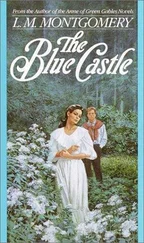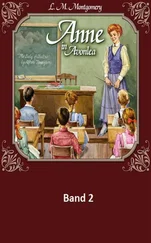How thankful she was that she hadn't told Teddy anything about it — she had been so strongly tempted to, and only refrained because she didn't want to spoil the dramatic surprise of the moment when she would show him the verses with her name signed to them. She HAD told Perry, and Perry was furious when he saw her tear-stained face later on in the dairy, as they strained the milk together.
Ordinarily Emily loved this, but to-night the savour had gone out of the world. Even the milky splendour of the still, mild winter evening and the purple bloom over the hillside woods that presaged a thaw could not give her the accustomed soul-thrill.
"I'm going to Charlottetown if I have to walk and I'll bust that Enterprise editor's head," said Perry, with the expression which, thirty years later, warned the members of his party to scatter for cover.
"That wouldn't be any use," said Emily drearily. "He didn't think it good enough to print — that is what hurts me so, Perry — he didn't think it any good. Busting his head wouldn't change THAT.”
It took her a week to recover from the blow. Then she wrote a story in which the editor of the Enterprise played the part of a dark and desperate villain who found lodging eventually behind prison bars. This got the venom out of her system and she forgot all about him in the delight of writing a poem addressed to "Sweet Lady April." But I question if she ever really forgave him — even when she discovered eventually that you must NOT write on both sides of the paper — even when she read over Evening Dreams a year later and wondered how she could ever have thought it any good.
This sort of thing was happening frequently now. Every time she read her little hoard of manuscripts over she found some of which the fairy gold had unaccountably turned to withered leaves, fit only for the burning. Emily burned them — but it hurt her a little.
Outgrowing things we love is never a pleasant process.
There had been several clashes between Aunt Elizabeth and Emily that winter and spring. Generally Aunt Elizabeth came out victorious; there was that in her that would not be denied the satisfaction of having her own way even in trifling matters. But once in a while she came up against that curious streak of granite in Emily's composition which was unyielding and unbendable and unbreakable. Mary Murray, of a hundred years agone, had been, so family chronicle ran, a gentle and submissive creature generally; but she had that same streak in her, as her "Here I Stay” abundantly testified. When Aunt Elizabeth tried conclusions with that element in Emily she always got the worst of it. Yet she did not learn wisdom therefrom but pursued her policy of repression all the more rigorously; for it occasionally came home to her, as Laura let down tucks, that Emily was on the verge of beginning to grow up and that various breakers and reefs loomed ahead, ominously magnified in the mist of unseen years, Emily must not be allowed to get out of hand now, lest later on she make shipwreck as her mother had done — or as Elizabeth Murray firmly believed she had done.
There were, in short, to be no more elopements from New Moon.
One of the things they fell out about was the fact that Emily, as Aunt Elizabeth discovered one day, was in the habit of using more of her egg money to buy paper than Aunt Elizabeth approved of.
What did Emily do with so much paper? They had a fuss over this and eventually Aunt Elizabeth discovered that Emily was writing stories. Emily had been writing stories all winter under Aunt Elizabeth's very nose and Aunt Elizabeth had never suspected it.
She had fondly supposed that Emily was writing school compositions.
Aunt Elizabeth knew in a vague way that Emily wrote silly rhymes which she called "poetry" but this did not worry her especially.
Jimmy made up a lot of similar trash. It was foolish but harmless and Emily would doubtless outgrow it. Jimmy had not outgrown it, to be sure, but then his accident — Elizabeth always went a little sick in soul when she remembered it — had made him more or less a child for life.
But writing stories was a very different thing and Aunt Elizabeth was horrified. Fiction of any kind was an abominable thing.
Elizabeth Murray had been trained up in this belief in her youth and in her age she had not departed from it. She honestly thought that it was a wicked and sinful thing in any one to play cards, dance, or go to the theatre, read or write novels, and in Emily's case there was a worse feature — it was the Starr coming out in her — Douglas Starr especially. No Murray of New Moon had ever been guilty of writing "stories" or of ever wanting to write them. It was an alien growth that must be pruned off ruthlessly. Aunt Elizabeth applied the pruning shears; and found no pliant, snippable root but that same underlying streak of granite. Emily was respectful and reasonable and above-board; she bought no more paper with egg money; but she told Aunt Elizabeth that she could not give up writing stories and she went right on writing them, on pieces of brown wrapping paper and the blank backs of circulars which agricultural machinery firms sent Cousin Jimmy.
"Don't you know that it is wicked to write novels?" demanded Aunt Elizabeth.
"Oh, I'm not writing novels — yet," said Emily. "I can't get enough paper. These are just short stories. And it isn't wicked — Father liked novels.”
"Your father — " began Aunt Elizabeth, and stopped. She remembered that Emily had "acted up" before now when anything derogatory was said of her father. But the very fact that she felt mysteriously compelled to stop annoyed Elizabeth, who had said what seemed good to her all her life at New Moon without much regard for other people's feelings.
"You will not write any more of THIS STUFF," Aunt Elizabeth contemptuously flourished "The Secret of the Castle" under Emily's nose, "I forbid you — remember, I forbid you.”
"Oh, I must write, Aunt Elizabeth," said Emily gravely, folding her slender, beautiful hands on the table and looking straight into Aunt Elizabeth's angry face with the steady, unblinking gaze which Aunt Ruth called unchildlike. "You see, it's this way. It is IN me. I can't help it. And Father said I was ALWAYS to keep on writing. He said I would be famous some day. Wouldn't you like to have a famous niece, Aunt Elizabeth?”
"I am not going to argue the matter," said Aunt Elizabeth.
"I'm not arguing — only explaining." Emily was exasperatingly respectful. "I just want you to understand how it is that I HAVE to go on writing stories, even though I am so very sorry you don't approve.”
"If you don't give up this — this worse than nonsense, Emily, I'll — I'll ... “
Aunt Elizabeth stopped, not knowing what to say she would do.
Emily was too big now to be slapped or shut up; and it was no use to say, as she was tempted to, "I'll send you away from New Moon,” because Elizabeth Murray knew perfectly well she would not send Emily away from New Moon — COULD not send her away, indeed, though this knowledge was as yet only in her feelings and had not been translated into her intellect. She only felt that she was helpless and it angered her; but Emily was mistress of the situation and calmly went on writing stories. If Aunt Elizabeth had asked her to give up crocheting lace or making molasses taffy, or eating Aunt Laura's delicious drop cookies, Emily would have done so wholly and cheerfully, though she loved these things. But to give up writing stories — why, Aunt Elizabeth might as well have asked her to give up breathing. WHY couldn't she understand? It seemed so simple and indisputable to Emily.
"Teddy can't help making pictures and Ilse can't help reciting, and I can't help writing. DON'T you see, Aunt Elizabeth?”
Читать дальше


